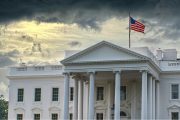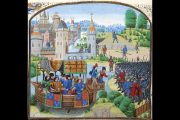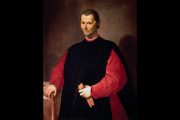
During 1919, one-fifth of the country’s workers would strike. The year started with New York’s harbor workers striking in January, followed by the dressmakers. In February news headlines reported a “prelude to revolution,” when a general strike in Seattle closed all businesses from February 6 to 11.
Bombs were mailed to the Mayor of Seattle, who broke the strike and, in April, 40 more mail bombs were found en route to other public leaders for May Day, the international communist holiday. With the backdrop of apparently spreading communism, many American citizens believed that they were on the verge of a workers’ revolution.
In Massachusetts, textile workers in Lawrence walked out in protest of a six-days-a-week, nine-hours-a-day work schedule. Boston telephone operators interrupted much of New England’s phone service in an April work stoppage and, in July, Boston’s elevated train workers staged their own walkout. Boston’s business and political leaders could see this national trend of strikes disabling their own businesses and communities, and they became increasingly alarmed.
Generous Grievances
There is no doubt that the Boston police force had legitimate grievances, which they had expressed as early as 1917. Starting pay for new officers had not risen in 60 years, since 1857, when new recruits received two dollars per day. Their wages were even lower than the earnings of most unskilled factory workers. Officers worked seven days per week, with a day off every other week, during which they could not leave town without special permission. Depending on duty assignments, officers worked between 72 and 98 hours per week, and were required to sleep in the station houses, in case they were needed. Officers were not paid for court appearances and they also complained about the deplorable conditions in police stations, which included the lack of sanitation, baths, beds, and toilets.
Since 1885, the Boston police had been under the command of a commissioner appointed by the state Governor. Though Boston’s Mayor controlled their budget, their operation and how they used the budget was controlled by this commissioner appointed by the Governor. This placed the Mayor, Andrew Peters, in a difficult position. His city was protected by a police force not under his control. When the police would succeed, the state would take the credit; but when there were problems, Peters, who was closest to them, could readily be made the scapegoat.
There was also an ethnic overlay. Protestant Yankees sought to control the Irish-Catholic rank and file of the Boston Police Department. This made the dispute about more than wages or work conditions; it quickly developed along lines of ethnicity.
By June of 1919, the grievances made by the police officers had not been addressed, so they turned to the American Federation of Labor (AFL) to consider unionization. Although police officers already had their own association called the Boston Social Club, founded by the police department in 1906 and operating under its sponsorship, Police Commissioner Edwin Curtis was outspoken in his condemnation of the movement to unionize. After all, the labor union movement had long been viewed with suspicion by many Americans, and those suspicions were heightened by the so-called workers’ revolution in Russia and by efforts to spread communism throughout the Western world.
In August the police were granted a union charter, which Commissioner Curtis opposed on the grounds that a policeman was not “an employee, but a state officer.” Mayor Peters was unreachable, being on an extended vacation in Maine, but Massachusetts Governor Calvin Coolidge and Attorney General Albert Pillsbury put forward legislation to make unionization illegal for public employees. Pillsbury would note that the “organized work man has taken us by the throat and has us at his mercy.” The lines of “us” versus “them” were quickly drawn.
From this point on, state officials focused on the legitimacy of public employees unionizing rather than the validity of the officers’ complaints. On August 20 Commissioner Curtis suspended eight of the leading police union organizers, followed soon thereafter by another 11 suspensions. The rank and file were ordered to turn in their nightsticks, and Curtis began to organize volunteer police substitutes.
Setting Policy in Stone
When Mayor Peters returned from vacation, he made conciliatory statements and organized a commission headed by prominent banker James Storrow. Storrow’s group recommended that Commissioner Curtis and the police agree to a police union without AFL ties and without the right to strike. Curtis would recognize the police union, and the union would agree to remain “independent and unaffiliated.” Storrow’s group also recommended that no action should be taken against the 19 officers whom Curtis had suspended. Four of Boston’s five newspapers backed the compromise, with only the Boston Transcript holding to a consistent anti-union position. The Boston Chamber of Commerce backed the compromise, as well.
Commissioner Curtis kept to his position that it would be inconsistent with the public interest to negotiate with a union, or have the police obliged to act upon the whims of any non-public organization, and that the need for public safety outweighed the officers’ asserted right to collective bargaining. As Curtis had put it earlier:
It is or should be apparent to any thinking person that the police department of this or any other city cannot fulfill its duty to the entire public if its members are subject to the direction of an organization existing outside the department…. If troubles and disturbances arise where the interests of this organization and the interests of other elements and classes in the community conflict, the situation immediately arises which always arises when a man attempts to serve two masters, — he must fail either in his duty as a policeman, or in his obligation to the organization that controls him.
With the backing of Governor Coolidge, Curtis rejected Storrow’s proposal.
But the police were emotionally committed to the union as the only effective means of making progress. The police union members responded on September 8 by voting 1,134 to 2 in favor of a strike, and scheduled it to start at evening roll call the next day. Their stated grounds omitted wages and working conditions. They were striking to protest the commissioner’s denial of their right to affiliate themselves with the AFL.
U.S. Senator Henry Cabot Lodge of Massachusetts described the strike as “the first step to sovietizing the country.” Governor Coolidge suggested that the city council raise wages and improve working conditions. Still, Coolidge’s commissioner held firm to his position and recruited about 200 Harvard University athletes and business men to step in during the expected strike.
Mayor Peters requested that Governor Coolidge dispatch the State Guard as a first reaction to the strike. Coolidge sided with his police commissioner, who advised that volunteers could fill the void and that troops should only be sent if needed.
On September 9, Boston Police Department officers went on strike at 5:45 p.m. Of the department’s 1,544 personnel, 1,117 (72 percent) refused to report for work. Governor Coolidge assigned 100 members of the state’s Metropolitan Park Police Department to replace the striking officers, but 58 of them refused to participate and were suspended from their jobs. Despite assurances from Commissioner Curtis to Mayor Peters and Governor Coolidge, Boston had little police protection for the night of September 9. Volunteer replacements were still being organized and due to report the next morning.
The Strike Plays Out
As residents absorbed the reality of the absence of police, the hooligans among them took the opportunity to engage in various petty crimes. There was gambling in public, purse snatching, and harassing of law-enforcement officers, both those on strike who were now without a badge and gun, as well as those who acted as strike breakers in the greatly weakened police force.
By 8:00 p.m. a crowd estimated at 10,000 gathered in Scollay Square, a center of amusement halls and theaters. Soon a cigar store window was broken and the store emptied. This was followed by a frenzy of looting and mayhem, including throwing rocks at streetcars and overturning the carts of street vendors, which took place downtown and in South Boston until well after midnight.
On the morning of September 10, political positioning ensued. Mayor Peters issued a press release saying that he was not to blame, and he called out the State Guard. He used an emergency clause to take control of the police whenever “tumult, riot, and violent disturbance” happened within the city. Coolidge reacted by issuing a statement that, as Governor, the Guard would be under his control, and that Coolidge, not Peters, would save Boston.
The president of Harvard University, Lawrence Lowell, called on more students to volunteer, as did Boston’s businessmen. Crowds waited outside police stations to attack the volunteers. Cries of “kill the cops” were heard. The Commander of Station 6 in South Boston kept his Harvard volunteers in the station in order to protect their lives.
At Scollay Square there were sporadic confrontations between the replacement police and the crowd, resulting in several Harvard students being cornered. When the first troop of cavalry arrived, they had to intervene to rescue groups of cornered police. Several guardsmen were injured by thrown rocks but, eventually, the threat of live ammunition and horsemen with swords pushed the crowd from Scollay Square.
Boston became a beehive of military activity, as Governor Coolidge eventually provided 5,000 State Guards. At the old armory, near the Park Plaza Hotel, mobile units with machine guns set up headquarters.
Violence peaked that evening, the night of September 10 and 11. But businesses were better prepared: Some had boarded up their windows, while others stayed open all night with armed guards visible, in order to discourage any thoughts of taking advantage of the absence of law-enforcement officers. But the Guard proved inexperienced at handling crowds and quick to assert control without regard for loss of life. Gunfire in South Boston left two dead and others wounded. Scollay Square was reportedly the scene of a riot where one died. The death total ultimately reached nine.
The next morning the Los Angeles Times wrote, “No man’s house, no man’s wife, no man’s children will be safe if the police force is unionized and made subject to the orders of Red Unionite bosses.” In Philadelphia, the Public Ledger reported, “Bolshevism in the United States is no longer a specter. Boston in chaos reveals its sinister substance.” And the Ohio State Journal declared, “When a policeman strikes, he should be debarred not only from resuming his office, but from citizenship as well. He has committed the unpardonable sin; he has forfeited all his rights.”
But when Governor Coolidge called the strikers “deserters” and “traitors,” a mass meeting of the Boston Police Union responded with wounded pride and a taunt of its own:
When we were honorably discharged from the United States army, we were hailed as heroes and saviors of our country. We returned to our duties on the police force of Boston.
Now, though only a few months have passed, we are denounced as deserters, as traitors to our city and violators of our oath of office.
The first men to raise the cry were those who have always been opposed to giving to labor a living wage. It was taken up by the newspapers, who cared little for the real facts. You finally added your word of condemnation….
Among us are men who have gone against spitting machine guns single-handed, and captured them, volunteering for the job. Among us are men who have ridden with dispatches through shell fire so dense that four men fell and only the fifth got through.
Not one man of us ever disgraced the flag or his service. It is bitter to come home and be called deserters and traitors. We are the same men who were on the French front.
Some of us fought in the Spanish war of 1898. Won’t you tell the people of Massachusetts in which war you served?
Mayor Peters feared that a general strike might follow, such as the one that closed Seattle, with the support of other unions and public employees. With order restored, he met with union leaders to seek a compromise. Governor Coolidge could afford to take a firmer stance, as ultimately he would not have to lead the city through a general strike. Furthermore, he had a supporter sitting inside the Central Labor Organization, “Diamond” Jim Timilty, who secretly promised that a general strike would not be called.
AFL chief Samuel Gompers, who had just returned from Europe, quickly assessed the situation and the strength of public sentiment and urged the strikers to return to work. The police accepted his recommendation immediately. On September 12, Gompers telegraphed Mayor Peters and Governor Coolidge, asking for the strikers to be reinstated and that all parties agree to wait for arbitration “to honorably adjust a mutually unsatisfactory situation.” Coolidge replied with a statement of support for Commissioner Curtis’ hard line. Gompers telegraphed Coolidge again, this time blaming Curtis for the crisis. Coolidge dismissed the commissioner’s behavior as irrelevant, because no provocation could justify the police walkout. His terse summation elevated his reputation on the national scene: “There is no right to strike against the public safety by anybody, anywhere, any time.” In the end, the show of force rapidly caused the strike to collapse and earned for Coolidge the image of a strict enforcer of law and order, as he declared that he would continue to “defend the sovereignty of Massachusetts.”
Labor was plentiful, so by mid-December Commissioner Curtis was able to hire an entirely new police force. The State Guard was able to return to their homes, but striking officers were not allowed to return to their jobs with the Boston Police Department, which went overwhelmingly to unemployed servicemen. The new recruits were granted higher pay, better working conditions, and additional holidays, and gained the additional benefit of free uniforms.
Governor Coolidge’s strong action was soothing to a fearful public, and he was easily reelected on November 4, 1919 with a 62-percent majority. A year later he would become the Vice President of the United States and, following the death of President Warren Harding, he became our 30th President on August 2, 1923. Mayor Peters would be defeated in his next election by his political rival James Curley, who had preceded him as Mayor.
While the Boston police strike proved to be temporarily disastrous for the union movement, and the AFL reversed its attempts at organizing police officers for another two decades, police were eventually allowed to form unions. However, it is still illegal for police to go on strike, and even informal work actions such as the “Blue Flu,” whereby large numbers of police officers call in sick at the same time, are seriously frowned upon.
— Photo: AP Images




